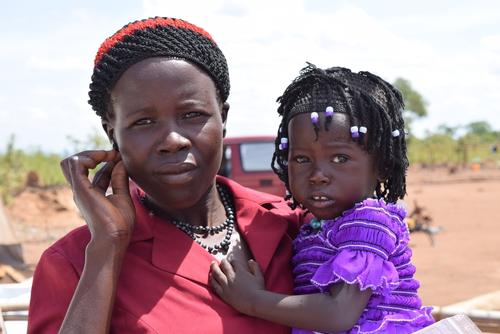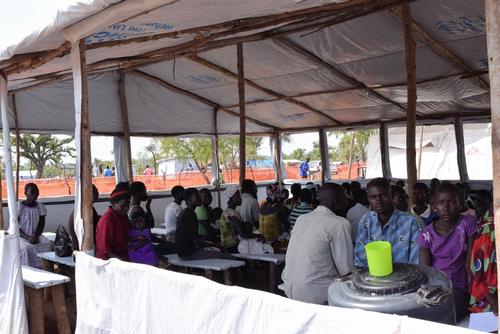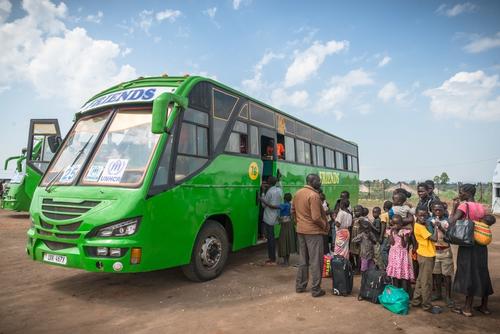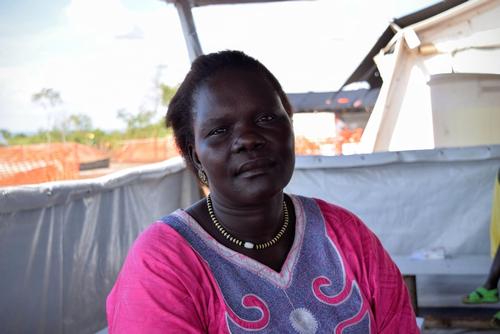I came to Uganda because of the violence in South Sudan. My next-door neighbours were dragged from their home by men, kidnapped and chopped into pieces. Other families were taken and I was worried I would be next, says 37-year-old Rose from Greater Equatoria region, who arrived in Uganda with her five children around a month ago.
Rose is one of more than 172,000 people who have arrived in northern Uganda in the last three months – all fleeing similarly traumatic experiences, or the threat of them, in South Sudan.
The Ugandan government put aside land near the town of Yumbe to host the new refugees, but these ‘zones’, together known as Bidi Bidi refugee camp, have been quickly filled. The government is opening up more land and creating new ‘zones’, but those processing new arrivals and running services for refugees are overwhelmed. Refugees are either living with no shelter or crowded into small shelters with other families, while access to food and water is a daily struggle.
As a result, many are falling ill and MSF, alongside other aid organisations, has responded by opening an outpatient and mobile clinic in the camp. MSF’s water and sanitation experts have built a number of toilets across the site and increased the amount of water distributed in the camp by trucking in 66,000 litres of water per day and building water pumps.
‘Rampant killing’ in South Sudan
On 8 July, violence broke out in South Sudan’s capital, Juba. Around a month later, the situation in the city was calm, although tense, but the conflict sparked outbreaks of violence in surrounding counties.
Patients in MSF’s outpatient clinic in Bidi Bidi refugee camp report horrifying accounts of violence taking place as recently as two or three weeks ago.
“We were working in the field when we heard gunshots,” says Bista, from Lainya County in Central Equatorial State, who arrived in Uganda just over a month ago. “I ran away from the town into the bush. As I was running, a bullet caught my little finger and crushed it. It was bleeding a lot so I used herbs from the bush to bind it. One day [around a month later] me and my neighbour sneaked back to the village to try and get food. Armed men spotted my neighbour. They attacked and raped her. She shouted and made a lot of noise, which gave me time to know what was happening and I lay on the ground and crawled back to the bush. That was the last time I saw my home.”
Other people say they’ve seen family members, neighbours or friends shot in front of them, while others report that their husbands disappeared from work, likely abducted by armed men.
Many talk about not having time to collect their belongings or even wait for family members to return home before fleeing, setting off on foot towards the safety of Uganda. Some walked for up to nine days, hiding from armed men in the bush on the way.

Those that do survive the perilous journey and arrive in the safety of Uganda are met by buses, driven to reception centres where they’re registered, and given a plot of land, blankets, a mosquito net, tools to build a house, kitchen utensils, food rations and jerry cans for collecting water.
Compared to the welcome that many refugees receive when they arrive in other countries around the world, this is a fairly warm reception. But the huge and sudden influx of people into Uganda has been difficult for authorities to manage and conditions in the camp aren’t good.
“The conditions in the camp at first were appalling. It was really difficult seeing people suffer,” says Enosh, a nurse and supervisor of the MSF outpatient clinic in Bidi Bidi refugee camp. “They’d left their life behind in South Sudan and, on top of that, they were getting ill from diseases like cholera.”
Many struggle to build a shelter for themselves and clear their plot of land. Food distribution has been chaotic and there are long queues next to water tanks as people wait for water trucks to arrive.
The poor conditions and lack of access to clean drinking water have contributed to the spread of illnesses like malaria, respiratory tract infections, skin infections, diarrhoea and dysentery. MSF has also seen a few cases of cholera.
“Every day, around 60 per cent of patients we see have malaria. There are many mosquitos. People are given a plot of land in the bush and often have nowhere to hang a mosquito net. We can treat people with malaria at the clinic but we’re also looking at whether we can spray areas to destroy mosquito breeding grounds,” says Enosh. The outpatient clinic sees between 70 and 200 people every day.
MSF is also looking at how to bring a permanent supply of drinking water to around 40,000 people living in ‘Zone 2’ of the camp by equipping the area with water pumps and pipes.
Peace at last
As the site continues to grow and thousands more people flood across the border every day, MSF will continue to monitor people’s health, nutrition and sanitation needs. For now, while it’s clear that conditions in the camp need improvement and people have clearly been through extremely traumatic events, they are also often relieved to have found peace. They are in a place where there are no gunshots and where they can start to rebuild their lives, albeit from scratch.
Mary, a 37-year-old refugee, waiting at the MSF clinic to be transferred to a nearby hospital says, “Compared to South Sudan, life is pretty good here. Everyone is dying in South Sudan; homes are being burnt and life is only stressful. Here in Uganda, it’s not easy, but I’m managing. The main problem has been getting enough food. But at least I’m here in a peaceful place, and at least now MSF are here I can get all the medication my family needs.”





